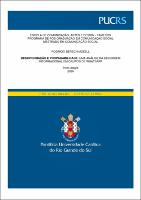| Share record |


|
Please use this identifier to cite or link to this item:
https://tede2.pucrs.br/tede2/handle/tede/9262| Document type: | Dissertação |
| Title: | Desinformação e propagabilidade: uma análise da desordem informacional em grupos de Whatsapp |
| Author: | Muzell, Rodrigo Bersch  |
| Advisor: | Pellanda, Eduardo Campos |
| Abstract (native): | Onipresente na mídia e em debates políticos, a expressão fake news é a face popular de um problema complexo: a desordem informacional. Diferentes tipos de problemas em conteúdos que circulam em redes sociais e, mais recentemente, no WhatsApp – desinformação, informações incorretas ou descontextualizadas, muitas vezes chamadas de notícias falsas – colocam em questão a confiança nas informações que recebemos. Este trabalho propõe-se a compreender mais sobre como as peças de desinformação se espalham analisando um grupo de exemplos desse fenômeno que se propagaram em grupos de WhatsApp. Inicialmente, contextualiza a pesquisa tratando dos conceitos de desordem informacional e desinformação, situando-os na sociedade em rede e cibercultura. Em seguida, trata de redes sociais digitais e estratégias que favorecem o espalhamento de conteúdo nesses ambientes marcados cada vez mais pela mobilidade, antes de detalhar origem e funcionamento de um deles, os grupos de WhatsApp. Por fim, realiza pesquisa qualitativa através de uma análise de conteúdo sobre as mensagens mais compartilhadas em grupos do aplicativo. A análise mostra a predominância de desinformação entre as mensagens que contém algum tipo de informação verificável; também mostra que as peças de desinformação mais compartilhadas têm características que favorecem a propagabilidade de mídias nas redes sociais. |
| Abstract (english): | Everywhere on mass media and political conversation, the term fake news is the popular face for a problem of great complexity: informational disorder. Different sorts of issues are seen on the content spread on social media (and, more recently, in messenger apps such as WhatsApp): disinformation, incorrect or out-of-context information, often called fake news. That increase the distrust in the information we receive. This work intends to understand more about how disinformation spreads, by analyzing a group of messages that went viral on WhatsApp groups. At first, it contextualizes the research, dealing with the informational disorder and disinformation concepts, placing them in the network society and cyberculture. Next, it deals with digital social networks and the strategies that makes easier the spread of content on those mobile environments – right before looking in detail into one of them, the WhatsApp groups. Finally, performs qualitative research by making a content analysis on the most shared messages in a set of groups. This analysis shows the predominance of disinformation among the messages that have any kind of verifiable information. It also shows that the most shared disinformation pieces have certain characteristics that makes them more spreadable on social networks. |
| Keywords: | Desinformação Fake news Notícias falsas Propagabilidade Desordem informacional Redes sociais Disinformation Fake news Spreadability Informational disorder Social networks |
| CNPQ Knowledge Areas: | CIENCIAS SOCIAIS APLICADAS::COMUNICACAO |
| Language: | por |
| Country: | Brasil |
| Publisher: | Pontifícia Universidade Católica do Rio Grande do Sul |
| Institution Acronym: | PUCRS |
| Department: | Escola de Comunicação, Arte e Design |
| Program: | Programa de Pós-Graduação em Comunicação Social |
| Access type: | Acesso Aberto |
| Fulltext access restriction: | Trabalho não apresenta restrição para publicação |
| URI: | http://tede2.pucrs.br/tede2/handle/tede/9262 |
| Issue Date: | 27-Mar-2020 |
| Appears in Collections: | Programa de Pós-Graduação em Comunicação Social |
Files in This Item:
| File | Description | Size | Format | |
|---|---|---|---|---|
| DISSERTACAO - ENTREGA FINAL PUCRS.pdf | RODRIGO_BERSCH_MUZELL_DIS | 1.73 MB | Adobe PDF |  Download/Open Preview |
Items in DSpace are protected by copyright, with all rights reserved, unless otherwise indicated.




